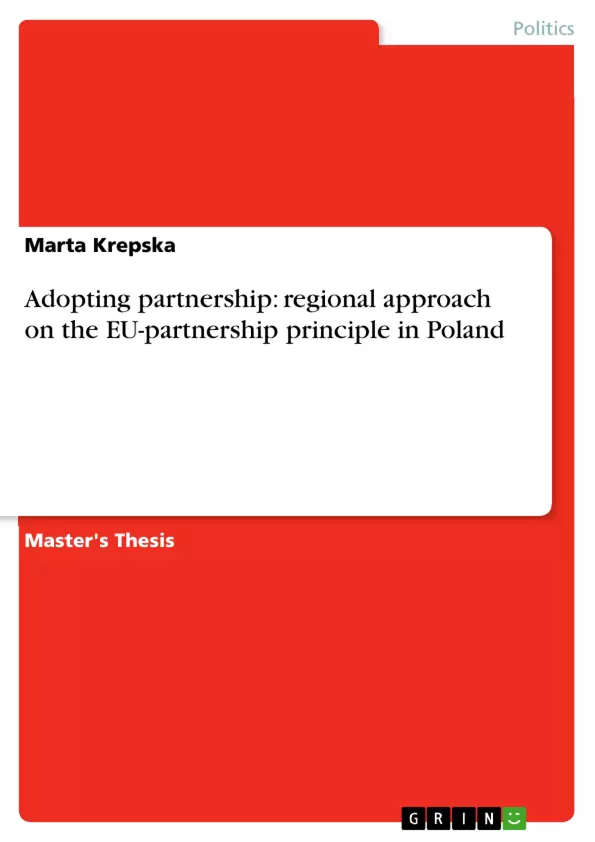Partnership has become a central principle of EU policies and is nowadays treated as a vital part of EU structural funds. The adoption of the partnership approach has been a challenge in the Polish public policy system throughout the 2004-2006 and 2007-2013 financial perspective periods. The thesis considers the adoption of the partnership principle at the regional level in Poland, focusing on the example of the Mazovia Monitoring Committee. It is concerned with the questions: How the expectations of the EU partnership approach are met in the regional practice? What is the actual role of social and economic partners in the decision-making process? How possible disparities between goals of the partnership policy and its outcomes can be explained?
The evidence presented suggests that there is significant resistance in adopting the partnership principle in the Mazovia Monitoring Committee. The implementation reality does not live up to the expectations of the partnership assumptions expressed in the EU cohesion policy. Partnership has more mechanistic character of fulfilling donor’s obligation than organic need of participatory working. In many aspects the partnership is a facade – it has an institutionalized form with limited content.
This can be explained by political mechanisms contained in the partnership principle. Partnership is not a neutral good governance tool that requires primarily managerial response; it is an inherently political vehicle influencing relations between stakeholders, their interests and positions in the decision-making structures. The crucial element of partnership implementation is an approach of authorities, their interests to engage in partnership mechanisms. Therefore, stimulating of motivation, commitment and willingness to achieve interests of both sides through partnerships is essential for the policy success. In the partnership policy-making it should be rather looked for motivation than further formalization of the process.
Inhaltsverzeichnis (Table of Contents)
- EU approach on the partnership
- Historical development of the partnership principle
- Partnership as a governance mechanism
- Purposes of partnership
- Partnership implementation framework 2007-2013
- Assessment of the EU partnership approach
- Institutional framework of the partnerships in Poland 2007-2013
- Implementation system of Regional Operational Programs
- Institutionalising partnership at the national level
- Regional Operational Program 2007-2013 of the Mazovia region
- Analysis of the partnership in Mazovia region in Poland
- Partnership participants structure
- Partnership institutional structure
- Impact of partnership
- Conclusions: meeting EU objectives by Mazovia Monitoring Committee
- Explaining the regional partnership implementation model
- Partnership as a public policy problem-solving
- Partnership as a power relation
Zielsetzung und Themenschwerpunkte (Objectives and Key Themes)
This thesis examines the adoption of the partnership principle at the regional level in Poland, specifically focusing on the Mazovia Monitoring Committee. It seeks to answer how the expectations of the EU partnership approach are met in regional practice, the actual role of social and economic partners in decision-making, and how disparities between partnership policy goals and outcomes can be explained. The key themes explored in the thesis include:- The implementation of the EU partnership principle in regional contexts
- The role and influence of social and economic partners in decision-making processes
- The impact of political mechanisms on the partnership principle
- The effectiveness of the partnership approach in achieving policy goals
- The significance of motivation, commitment, and willingness in partnership success
Zusammenfassung der Kapitel (Chapter Summaries)
The first chapter delves into the EU's approach to partnership, tracing its historical development and outlining its role as a governance mechanism. The chapter further explores the purposes and implementation frameworks of the partnership principle within the 2007-2013 financial perspective, concluding with an assessment of its effectiveness.
Chapter two shifts focus to the institutional framework of partnerships in Poland during the 2007-2013 period. It examines the implementation system of Regional Operational Programs, the institutionalization of partnership at the national level, and specifically analyzes the Regional Operational Program 2007-2013 of the Mazovia region.
The third chapter delves into the analysis of partnership in the Mazovia region. It investigates the structure of partnership participants and institutions, assesses the impact of the partnership approach, and draws conclusions about the Mazovia Monitoring Committee's success in meeting EU objectives.
Chapter four aims to explain the regional partnership implementation model. It explores the partnership as a means of addressing public policy challenges and as a manifestation of power relations.
Schlüsselwörter (Keywords)
The central themes and concepts explored in this thesis include EU partnership, regional governance, participatory decision-making, political mechanisms, implementation effectiveness, and regional development in Poland. These themes are examined through the lens of the Mazovia Monitoring Committee, providing insights into the complexities of adopting the EU partnership principle at a regional level.Frequently Asked Questions
What is the EU partnership principle?
It is a central principle of EU cohesion policy requiring cooperation between authorities and social/economic partners in managing structural funds.
How is the partnership principle implemented in Poland?
The thesis examines the Mazovia Monitoring Committee, finding that implementation is often mechanistic and serves to fulfill donor obligations rather than organic participation.
Why is partnership sometimes described as a "facade"?
In many cases, partnership has an institutionalized form but limited actual influence on decision-making, acting more as a formal requirement than a reality.
What role do political mechanisms play in these partnerships?
Partnership is not just a management tool; it is a political vehicle that influences power relations and the interests of stakeholders in decision-making structures.
What is essential for the success of a partnership policy?
Stimulating motivation, commitment, and a genuine willingness of authorities to engage with partners is more important than further formalizing the process.
- Quote paper
- Marta Krepska (Author), 2009, Adopting partnership: regional approach on the EU-partnership principle in Poland , Munich, GRIN Verlag, https://www.grin.com/document/198826



